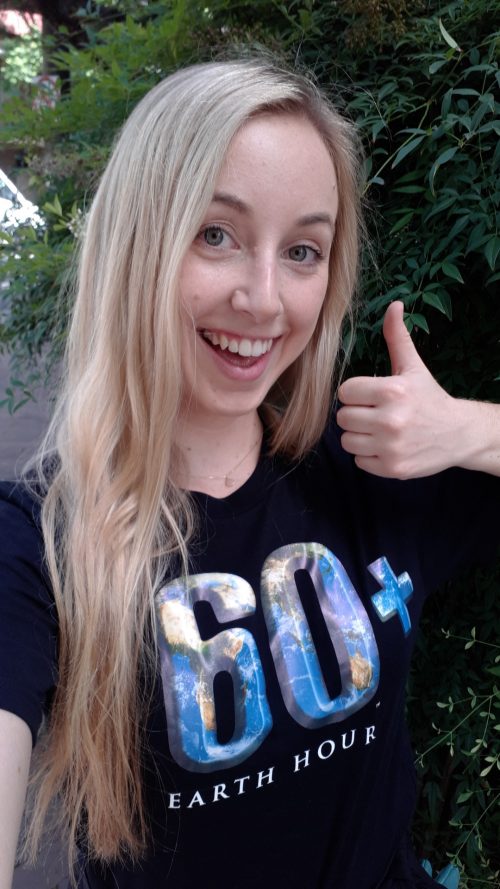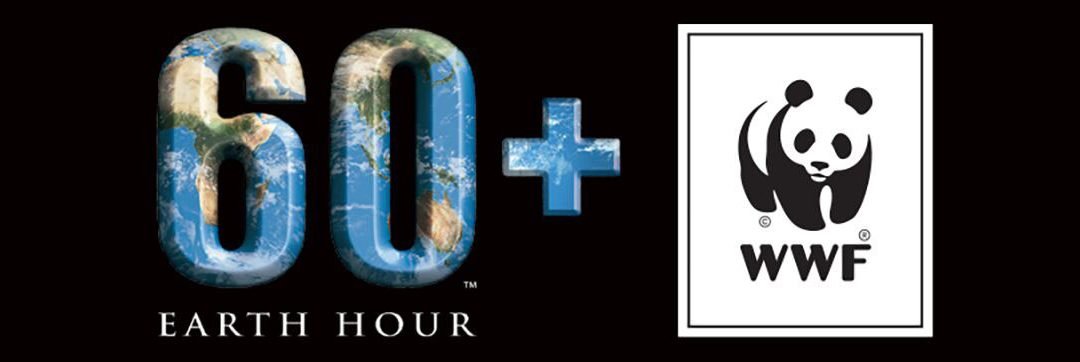We spoke to Jasmine Ledger from WWF Earth Hour to find out more about this global campaign.

Jasmine Ledger from WWF’s Earth Hour
What does your position at WWF Earth Hour involve?
The Earth Hour team is a small but powerful engine; my teammates are incredibly hardworking and inspiring, but my entirely unbiased opinion is that my job as Earth Hour Coordinator is the best! I get to talk to the people who are passionate about everything Earth Hour stands for: climate change action to protect the people and nature that we love.
Tell us about WWF and Earth Hour.
World Wildlife Fund (WWF) is a global environmental non-government organisation with offices in over 100 countries. WWF Australia started as a team of 3 people working out of an old factory in Sydney in 1978. WWF Australia founded Earth Hour in Sydney in 2007, and by the next year, the phenomenon had reached over 30 countries.
Today Earth Hour has grown to become the world’s largest grassroots movement for climate change. Last year, a record-breaking 188 countries and territories, 7000 cities and 17,900 landmarks switched off to demonstrate their support for climate change action in the largest Earth Hour to date. We hope that we can make 2019 bigger and better!
What’s the main aim of the Earth Hour movement?
The aim of the Earth Hour movement is to facilitate a unified, symbolic gesture to support the need for stronger climate action. At its core, it is a global, grass-roots movement that is entirely dependent on the community for momentum. It comes down to the aim of the supporters, who demonstrate each year, the breadth of support climate change action has. Every year, Earth Hour inspires discussion about the environment, climate change and biodiversity. This is what I am aiming for this year; resonant public discussion and, hopefully, positive impact on local environments thanks to spirited Earth Hour supporters
We are experiencing one of the hottest summers on record in New South Wales. Is it too late to make a difference on the climate change front?
Our summers have been demonstrating an upward trend year on year for the past decade, but we still have some time to have a lasting impact. Statistics suggest that more and more people are embracing sustainable practices, with habits like the use of reusable bags, containers and coffee cups, low-emission methods of transportation, and vegan, vegetarian and “flexitarian” diets becoming more common. If these habits continue to develop, and climate change policies are strengthened, then there is hope to make some real, impactful changes before we reach the “point of no return,” which is currently predicted to be 2035. Discover more about your climate future with this interactive guide.
Earth Hour is a great way for the public to show the world that stronger climate change and sustainability policies are needed, and supported by their constituents. We need support and leadership from all constituents – governments, communities, businesses to make a real difference. And for individuals, Earth Hour demonstrates that every little action makes a difference.
What are some learnings from the 2018 Earth Hour campaign?
Earth Hour 2018 taught us that our community, above all, loves and wants to protect Australia’s spectacular natural landscapes and wonderful wildlife. Australia is home to some of the world’s most unique wildlife and landscapes; this makes our ecosystems particularly special. The impact of climate change puts iconic species like koalas, turtles and penguins, and unique ecosystems like the Great Barrier Reef under stress, causing a reduction in biological diversity.
Can you tell us what we can expect from this year’s Earth Hour campaign in Sydney?
I have a feeling that Earth Hour 2019 will be the biggest one yet! People are already signing up at www.earthhour.org.au to switch off for the hour, and we have been hearing from schools, organisations, individuals and councils from all over the country, most of which are interested in exploring the way they can extend their impact beyond the hour. So many people are interested in making an impact via events, challenges or programs like switching to renewable energy, or taking part in our Solar Light Challenge.
Earth Hour has been given a mission by the UN Convention of Biological Diversity (CBD) to raise awareness on biodiversity and climate change, that has one, clear way for supporters to demonstrate their support for the planet – by switching off their lights for one hour at 8.30pm on Saturday, 30 March 2019. The accessibility of this action ensures that everyone can take part, and the beauty of it is that it gets people thinking about what more they can do. Earth Hour asks you to switch off, but it really motivates people to act beyond the hour. It is there to provoke thought, and to demonstrate a community unified by their concern for our precious Australian ecosystems.
Join me, and join your local community to take some time to #Connect2Earth. I’d recommend at least an hour, and the best time for it is at 8.30pm, on Saturday, 30 March 2019. Go to www.earthhour.org.au or email community@earthhour.org.au for more information.

